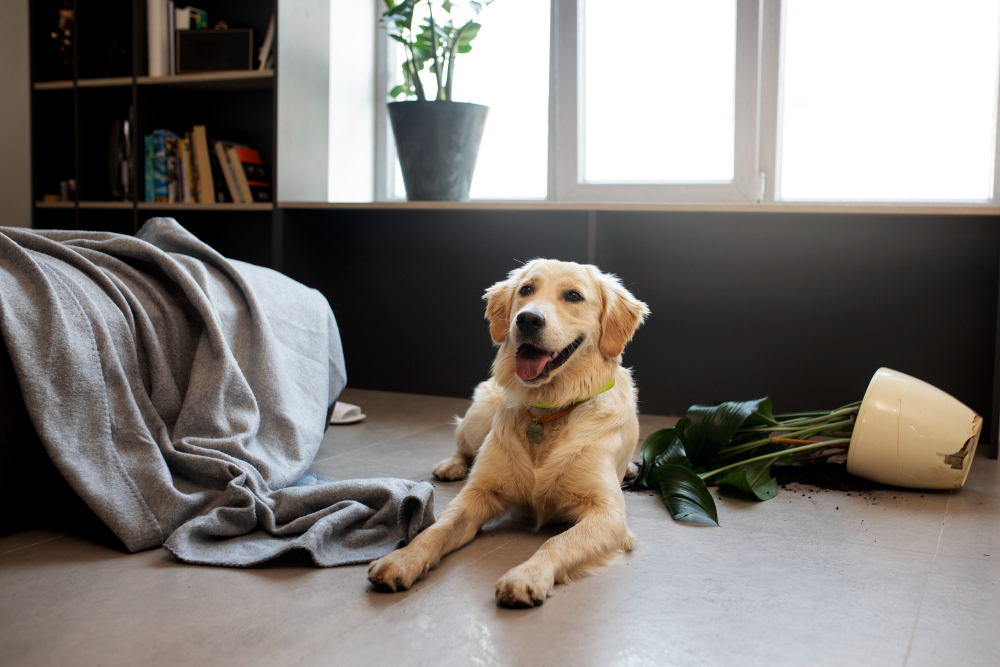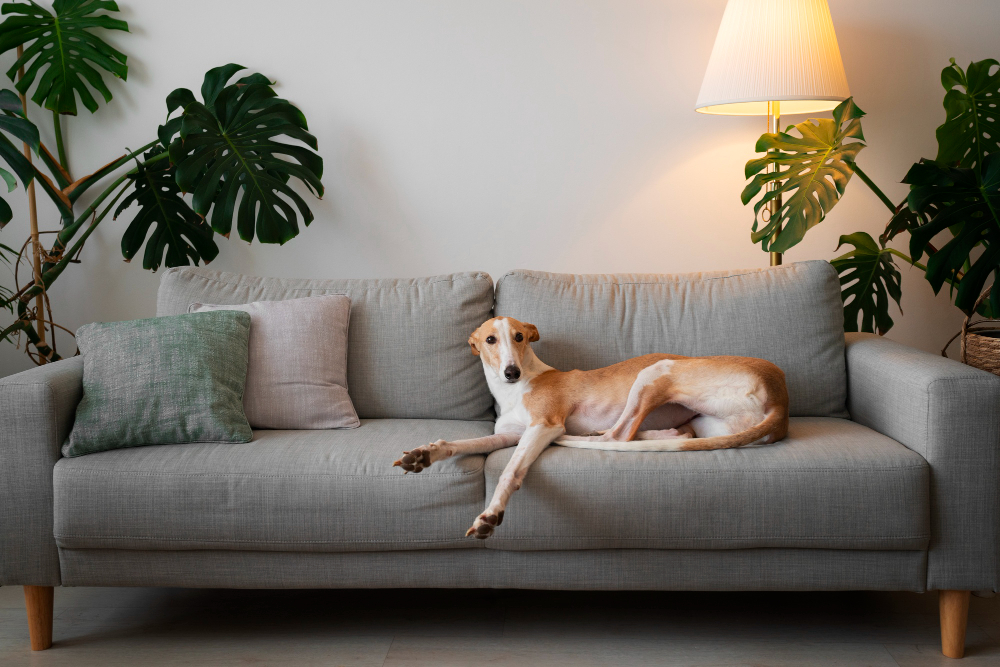It can be stressful leaving your newly adopted dog home alone for the first time, no matter if they’re a puppy or adult. Whether you’re stepping out for work, social outings, or errands, there’s no getting around leaving them at some point. And while dogs enjoy the company of their humans, that doesn’t mean leaving them home alone is bad or dangerous.
How long you can leave a dog alone depends on many factors. We spoke with certified professional dog trainer Alexandra Bassett, CPDT-KA, lead dog trainer, behavior consultant, and owner of Dog Savvy, to learn more. With her insight, we discovered helpful advice about how long you can leave your dog alone and how to best go about for the first few times.
How Long Can Dogs Be Left Alone?
“The amount of time you can leave a dog alone depends on their age, temperament, energy levels, and ensuring all their needs have been met before leaving them alone,” says Bassett. A good rule of thumb is to avoid leaving a puppy home alone for longer in hours than their age in months.
For example, you wouldn’t want to leave a five-month-old puppy home alone for longer than five hours.
Puppies under five months old often need more potty breaks and attention, so Bassett recommends not leaving them alone for longer than three to four hours.
Older dogs who are used to their routines and have their needs met (they’ve eaten, exercised, and used the potty) are usually able to be left alone for six to eight hours. However, some dogs may need more frequent bathroom breaks as they age, so you’ll want to base the time around your dog’s individual needs.
More active dog breeds, such as Australian Shepherds and Jack Russell Terriers, may also have trouble spending long spans of time alone compared to dogs with moderate to low energy levels, like Bulldogs and Great Danes.
If you need to leave your dog alone for long periods of time, don’t despair. Bassett recommends getting someone to help out. “It’s a good idea to hire a dog walker to walk a dog to break up the monotony of their day or a pet sitter to stop by and care for a puppy if they need to be left alone for long hours while someone is at work,” she says.
How Long Can You Leave a Dog in a Crate?
What about using a crate? How long can an adult dog or puppy stay in a crate alone? In general, the answer is the same: you won’t want to leave your puppy alone for more hours than their age in months. This number might be even lower for puppies under five months, Bassett cautions, since they often need more care and attention—it depends on the puppy.
“I generally recommend using a crate in conjunction with a playpen so that if someone has to leave their puppy alone for more than three to four hours, they should leave them in a playpen with a designated potty area (using pee pads) rather than leaving them in a crate and risking them going potty on themselves or developing crate anxiety,” says Bassett.
Using a playpen can also be helpful for adult or senior dogs who may need more potty breaks or have crate anxiety.
Preparing your dog for the crate
Before leaving your dog alone in a crate for extended hours, it’s essential to practice crate training before the event. “Pet parents should implement regular downtime in a crate or pen that mimics their daily routine—like when they expect to be out of the house during work hours—to help a dog get used to spending time alone during those times before they actually leave it alone,” Bassett says.
One way to do this is by placing the crate in an area of your home where people spend the most time so that your pup can see their house members and learn to relax while in the crate.
You’ll also want to ensure the crate is big enough for your dog to turn around in and relax. Remove harnesses and collars before putting your dog in a crate to prevent them from getting caught when no one is around.

Can I Leave My Dog Alone Overnight?
Leaving your dog alone overnight depends on a few factors. “It’s much easier to leave dogs alone if they are part of a muti-dog household since they have each other to keep each other company than to leave a single dog by itself overnight,” points out Bassett. “Dogs are pack animals and, therefore, social creatures who prefer the company of others to being left alone, so it’s not ideal to do this regularly.”
Your dog’s age and needs also come into play. It may be fine if your dog is used to being alone for extended periods (let’s say if you frequently work outside the home). But if your dog is a puppy, suffers from separation anxiety, or needs more frequent potty breaks, try not to leave them alone for more than six to eight hours.
But life happens. And we know sometimes pet parents are in a pinch and need to be away from their pups overnight. In events like this, it’s best to hire a pet sitter or have a friend drop by right before bed and again early in the morning for adult dogs. If your dog tends to get into trouble when alone, section off an area of the house to keep them more contained.
How To Prepare Your Dog To Be Alone
One way to prepare your dog for being alone is to provide them with moments of physical activity throughout the day. This exercise could look like taking them on a walk or playing a game of fetch. Individual exercise needs vary depending on your dog’s age, breed, and health level.
For instance, herding and sporting dogs often require more intense and lengthy activity. On the other hand, lower-energy breeds and older dogs can do with significantly less. But every dog needs to stretch its legs a couple of times a day, so if you’re going to be out for a bit, be sure to give them some exercise beforehand.
Dogs also need mental stimulation. Whether it’s a training session, a puzzle feeder, chew-safe bone, or a round of indoor games, enrichment activities help keep your dog healthy and balance out the time they spend alone. If you know your dog can be trusted with toys alone, you can also leave them out while you’re away to provide a source of activity.
For dogs with mild separation anxiety, leaving them with a heartbeat toy or a shirt or blanket that smells like you can be a source of comfort while you’re away. Dog parents might also consider boarding their dog in the home of a trusted pet sitter if they plan to be away for a longer duration.
